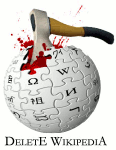The Wikipedia Deletion Wars
There’s a fabulous insider’s account of how topics make it or don’t make it into Wikipedia. Why does one person, company, or place get their page while another doesn’t?The process is full of flawed humanity, and not at all as objective as a newbie might think. Written by Nicholson Baker, this detailed report is tucked into a book review of “Wikipedia: The Missing Manual”.

This first-person account, disguised as a long book review in the New York Review of Books, delves deep into the core negotiations that every line in Wikipedia is subject to. But the piece really shines in describing a current fad on Wikipedia — deleting less popular subjects entirely. Here’s a bit:
In the fall of 2006, groups of editors went around getting rid of articles on webcomic artists—some of the most original and articulate people on the Net. They would tag an article as nonnotable and then crowd in to vote it down. One openly called it the “web-comic articles purge of 2006.” A victim, Trev-Mun, author of a comic called Ragnarok Wisdom, wrote: “I got the impression that they enjoyed this kind of thing as a kid enjoys kicking down others’ sand castles.” Another artist, Howard Tayler, said: “‘Notability purges’ are being executed throughout Wikipedia by empire-building, wannabe tin-pot dictators masquerading as humble editors.” Rob Balder, author of a webcomic called PartiallyClips, likened the organized deleters to book burners, and he said: “Your words are polite, yeah, but your actions are obscene. Every word in every valid article you’ve destroyed should be converted to profanity and screamed in your face.”
As the deletions and ill-will spread in 2007—deletions not just of webcomics but of companies, urban places, Web sites, lists, people, categories, and ideas—all deemed to be trivial, “NN” (nonnotable), “stubby,” undersourced, or otherwise unencyclopedic—Andrew Lih, one of the most thoughtful observers of Wikipedia’s history, told a Canadian reporter: “The preference now is for excising, deleting, restricting information rather than letting it sit there and grow.”

Image from The Great Wikipedia Webcomic Purge of 2007
Baker’s ode to the complexities of Wikipedia’s genesis is crammed with wonderful details. He describes the little-known fact that many articles about historical subjects begin from older encyclopedias in the public domain.
But [Wikipedia] also became great because it had a head start: from the beginning the project absorbed articles from the celebrated 1911 edition of the Encyclopedia Britannica, which is in the public domain. And not only the 1911 Britannica. Also absorbed were Smith’s Dictionary of Greek and Roman Biography, Nuttall’s 1906 Encyclopedia, Chamber’s Cyclopedia, Aiken’s General Biography, Rose’s Biographical Dictionary, Easton’s Bible Dictionary, and many others. In August 2001, a group of articles from W.W. Rouse Ball’s Short Account of the History of Mathematics—posted on the Net by a professor from Trinity College, Dublin—was noticed by an early Wikipedian, who wrote to his co-volunteers: “Are they fair game to grab as source material for our wikipedia? I know we are scarfing stuff from the 1911 encyclopedia, this is from 1908, so it should be under the same lack of restrictions….” It was. Rouse Ball wrote that Pierre Varignon
“was an intimate friend of Newton, Leibnitz and the Bernoullis, and, after l’Hospital, was the earliest and most powerful advocate in France of the use of differential calculus.”
In January 2006, Wikipedia imported this 1908 article, with an insertion and a few modernizing rewordings, and it now reads:
“Varignon was a friend of Newton, Leibnitz, and the Bernoulli family. Varignon’s principal contributions were to graphic statics and mechanics. Except for l’Hôpital, Varignon was the earliest and strongest French advocate of differential calculus.”
But the article is now three times longer, barnacled with interesting additions, and includes a link to another article discussing Varignon’s mechanical theory of gravitation.
We have a idealized notion of how Wikipedia is created — that there is a inert Darwinian struggle between uninformed nonsense and higher quality information as they are selected in the hive mind, and the good stuff wins over time. The truth is that Wikipedia is a hive mind of human ego, hubris, obsession, and passion. Each article suffers through a human drama worthy of a soap opera. Indeed I can safely predict there will be novels and TV shows built around the maelstrom in a single Wikipedia article someday.
To the creators of Web 2.0 and beyond it is vital to remember than this power of the hive mind is intensely messy and full of the wild territory of personality and humanity. The crowd is both wiser and more irrational in aggregate. The tools to make this crowd useful are primarily the tools of dealing with people.
So who won the deletion wars? According to Wikipedia, the deletionists lost. Sure articles are deleted all the time, but there is more agreement now on the kind of articles that truly are worth keeping.
If every Wikipedian had been a staunch inclusionist, we’d have tens of thousands of articles on gay and smelly high school kids, not to mention every pet cat who ever did something adorable. On the other hand, if every Wikipedian had been a staunch deletionist, we’d be a boring clone of Encarta with no ads. Maybe each side did have something to offer after all, even if it was only keeping the other side down. But the time of the deletionists and inclusionists has, now and forever, come to an end…


